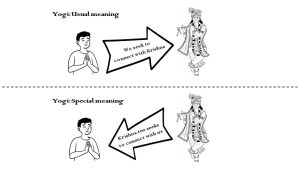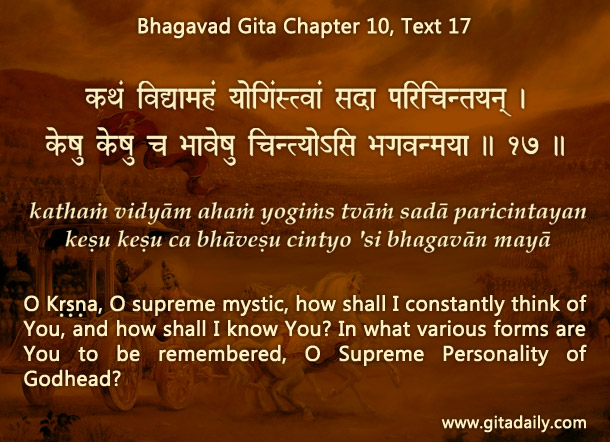
Among the many names that Arjuna uses to address Krishna in the Bhagavad-gita, one of the most intriguing is yogi (10.17). Why is this usage intriguing? Because it doesn’t seem appropriate for Krishna. It usually means ‘a practitioner of yoga.’ Krishna is not generally included among such practitioners. He is the ultimate reality, the supreme object of yogic meditation. Emphasizing his unique position, he is sometimes referred to as yogeshvara (18.75), which can refer to him as the Lord of yogis or as the Lord of mystic powers, which are attained by the practice of yoga.
Does Arjuna not know Krishna’s supreme position? He does; he has heard about it throughout the Gita, especially from its seventh chapter onward. And he himself has unambiguously reiterated it (10.12-13) just a few verses before this reference.
Could Arjuna be referring to Krishna as an exemplary practitioner of yoga? Maybe. Krishna does say that he performs his duty meticulously (03.22-24), because leaders need to set an example for everyone (03.21). But therein, Krishna refers to his doing his duties as a royal prince and a martial guardian of society — which is also the duty that he wants Arjuna to do on the Kurukshetra battlefield. In the Gita’s context, Krishna is neither exemplifying his own practice of yoga, nor recommending it to Arjuna.
Why, then, does Arjuna refer to Krishna as yogi? Arjuna’s usage centers on the fundamental meaning of yoga: connection, specifically connection of all of us as souls with Krishna. While we normally think of yoga as the process by which we connect with Krishna, the preceding verses (10.10-11) have highlighted how Krishna too tries to connect with us. Why? Because he is so loving and so merciful; he wants to be united with us and works to help us unite with him if we just express some interest. Alluding to Krishna’s benevolence, Arjuna aptly refers to him as a yogi, implicitly inquiring thereby: “How does Krishna make it possible for us to remember him amid life’s hustle-bustle?” This implication is confirmed by Krishna’s answer, wherein he outlines his extraordinary manifestations (vibhutis) which naturally attract our attention during our routine functioning in the world.
One-sentence summary:
Krishna is referred to as a yogi because he lovingly and mercifully seeks a connection with us.
Think it over:
- Why is Arjuna’s referring to Krishna as yogi intriguing?
- In what sense is Krishna a yogi?
- What is Arjuna’s implication in using this name?
***
10.17: O Krishna, O supreme mystic, how shall I constantly think of You, and how shall I know You? In what various forms are You to be remembered, O Supreme Personality of Godhead?
To know more about this verse, please click on the image


All people yearn for stoicism a few earn it
Could you please use capital letters for He, Him, His, Himself etc when refering to Krishna following how Srila Prabhupadas books are written as in this example from the introduction in Bhagavad gita.
“He tells Arjuna that He is relating this supreme secret to him because Arjuna is His devotee and His friend. The purport of this is that Bhagavad-gītā is a treatise which is especially meant for the devotee of the Lord. There are three classes of transcendentalists, namely the jñānī, the yogī and the bhakta, or the impersonalist, the meditator and the devotee. Here the Lord clearly tells Arjuna that He is making him the first receiver of a new paramparā (disciplic succession) because the old succession was broken. It was the Lord’s wish, therefore, to establish another paramparā in the same line of thought that was coming down from the sun-god to others, and it was His wish that His teaching be distributed anew by Arjuna. He wanted Arjuna to become the authority in understanding the Bhagavad-gītā.
As it is also stated in this Christian article.
” English speakers also traditionally capitalize the pronouns He, (His, Him) in reference to God. This remains a common practice among people of faith.”
Thank you
Your servant
Ayodhyadeva Rama das
ps This is my second comment in this connection.
Thanks for your response to our earlier discussion, where I had referred to these links:
https://www.thespiritualscientist.com/2020/06/by-using-the-lower-case-pronoun-for-krishna-arent-you-minimizing-his-position/
and
https://www.thespiritualscientist.com/2012/09/why-do-you-use-the-lower-case-pronoun-for-god-he-instead-of-he-isnt-it-disrespectful/
Regarding the concerns you have raised in this comment, it’s worth noting that Prabhupada used the language and linguistic conventions of his times – he spoke and wrote in the Bengali of the 20th century, not in the Bengali that was used to write the Chaitanya Charitamrita, though that book is our sacred text.
It is reasonable to infer that Prabhupada would not have stuck to an outdated English convention that has no basis in Sanskrit or scripture.
Even most contemporary Christian authors / pastors have rejected that convention. Here is an example from an influential Christian site:
https://www.crosswalk.com/faith/spiritual-life/should-christians-capitalize-all-pronouns-referring-to-god.html
Why do we need to hold on to obsolete Western linguistic customs to show our respect to God as revealed in our tradition? Is our God so weak or is our faith in God so weak or is our ability to share our convictions so weak that any or all of these will be endangered if we stop using the upper case pronoun? Isn’t it high time that we get rid of such tragic colonial hangovers?